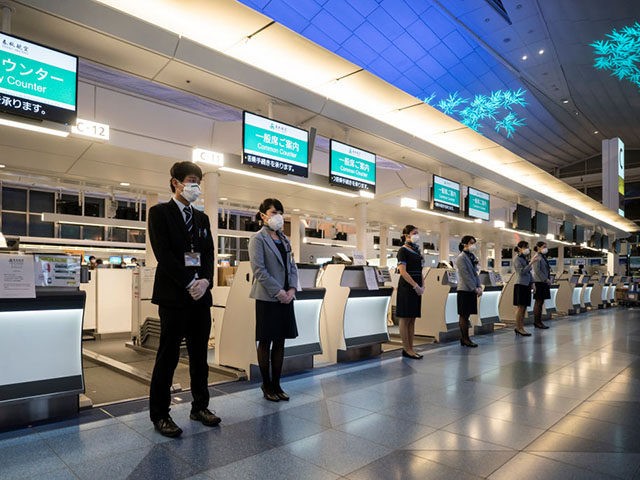Japan’s health ministry on Monday released the names of three people it accused of violating a state-mandated coronavirus quarantine period after returning to Japan from overseas in recent days, the Japan Broadcasting Corporation (NHK) reported Tuesday.
Japan’s Ministry of Health, Labor, and Welfare on August 2 published the names of three individuals on its website for allegedly violating previously agreed to protocol upon returning to Japan from abroad. The announcement marked the first time Japan’s government has “named and shamed” quarantine violators since threatening to do so in January.
“Three people in the 20 to 39 age range were named on the ministry’s website on Monday. They arrived in Japan on July 21 from South Korea and Hawaii. All three tested negative for the coronavirus at their points of entry,” according to NHK.
“The ministry says the three individuals it named never provided their location data and have not responded to video calls. It says their actions were deemed to be intentional,” the broadcaster added.
Japan currently requires all travelers arriving in the country to provide a negative coronavirus test result to immigration authorities taken within 72 hours of departure. Upon arriving in Japan, travelers must submit to a second test for the Chinese coronavirus.
“Even if the results are negative, people are asked to pledge they will self-quarantine for 14 days in their home, a hotel or another facility,” Kyodo News reported on May 1.
In addition to the testing, Japan’s health ministry requires all travelers to download a location tracking app called OEL (Overseas Entrants Locator) on their smartphones upon arrival at Japanese airports. The government-contracted app sends users “notification messages requesting location information and health status sent on a daily basis during the quarantine period,” according to the Japanese news site.
“Those who fail to report their whereabouts are contacted individually [by Japan’s health ministry] via a Skype video call or other methods,” Kyodo News added.
“The health ministry, which has asked for people to honor their pledge, has warned that penalties for noncompliance include publicly revealing names or, in the case of a foreign national, revocation of their status of residence and deportation,” the news site reported at the time.
The Japan Times in late March detailed the extent to which Japanese government authorities track and trace recent arrivals to Japan during the Chinese coronavirus pandemic.
“When people arrive at the airport … they are required to share their contact information, such as phone number and email address, with officials at the Health Monitoring Center for Overseas Entrants (HCO) affiliated with the [Japanese] health ministry,” according to the newspaper.
After being asked to download the OEL location tracking app, “they will also be asked to … turn on their GPS location setting [on their smartphones] so that their whereabouts can be tracked during the quarantine period,” the publication reported.
Immigration officers at Tokyo’s two main international airports, Haneda and Narita, have “been checking whether the [OEL] apps are correctly installed” on travelers’ smartphones since March, according to the newspaper. People who do not have a smartphone must rent one at the airport before they are allowed to leave.
“During the quarantine period, which starts one day after entering Japan, they [travelers] will receive notification messages from OEL telling them to click ‘I’m here now’ on the app, which will send their location to [Japanese government] officials,” the Japan Times continued.
“Those who fail to report their whereabouts will be contacted by Skype or email. Skype video calls will be also used for random checks to confirm whether people are self-isolating where they should be,” the newspaper revealed.
Japan’s health ministry in May said it was “considering having private security companies pay visits to quarantine locations if the person cannot be reached for more than three days.”

COMMENTS
Please let us know if you're having issues with commenting.